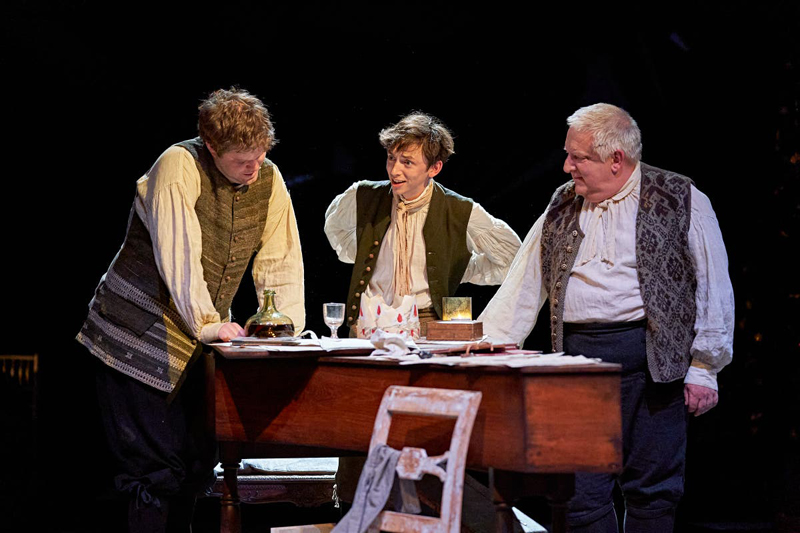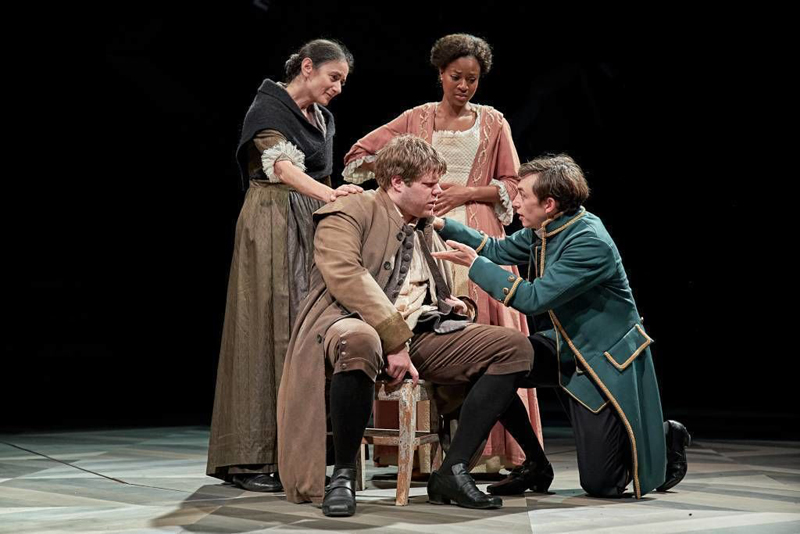“Bach & Sons”: Bridge Theatre
Neil Dowden on the South Bank
4 July 2021
The Bridge Theatre — which boldly led the way in London when theatres were allowed to reopen in the summer of 2020 — reopened this summer after the second lockdown with Nina Raine’s new biographical play Bach & Sons. It’s a family drama centred around the great eighteenth-century German composer Johann Sebastian Bach, depicting him as a sublime musician but a flawed human being. In a smart production helmed by artistic director Nicholas Hytner, this period piece is a real departure for Raine whose plays such as Tribes, Tiger Country, and Consent have dealt with edgy contemporary issues.

Dougie McMeekin, Samuel Blenkin, Simon Russell Beale. Photo credit: Manuel Harlan.
Other modern plays about composers include two by Ronald Harwood about Gustav Mahler and Richard Strauss (which focused on the pressure put on them to convert and collaborate in antisemitic, authoritarian societies) and of course Peter Shaffer’s huge hit Amadeus, which plays fast and loose with historical truth on the Mozart-Salieri rivalry but is a dynamic piece of theatre. Bach & Sons tends to go in the opposite direction: although the dialogue is written in colloquial modern English and some of the content is genuinely enlightening, as a whole the play is a bit heavy on expository period detail and fails to fully come to life as a drama.
It opens late at night with Johann Sebastian at home playing notes over and over again on a harpsichord as he tries to solve a musical problem, while a baby cries in the background. This sets the pattern for the portrayal of Bach’s relationships with his family, for so obsessed is the master with his work that he neglects his domestic roles as both father and husband. Raine depicts Bach the composer as a perfectionist, believing his music to be divinely inspired. But Bach the man is argumentative with his patrons, selfish towards his first wife Maria Barbara, and overbearing towards his sons Wilhelm Friedemann and Carl Philipp Emanuel who are both budding composers.

Ruth Lass, Douggie McMeekin, Rachel Oforl and Samuel Blenkin.
Photo credit: Manuel Harlan.
The first act feels rather static and stuffed with background information about how Bach comes from a long line of musicians, how his parents died when he was a child, and how as a young man he went to prison after being sentenced for stabbing a bassoonist. By the second act Bach has moved to Leipzig and, after Maria Barbara’s sudden death, married the young soprano Anna Magdalena Wilcke. The talented but wayward Wilhelm has declined into alcoholism while the less naturally gifted but more conformist Carl has thrived at the court of Frederick the Great. The latter introduces his father to his royal patron but Bach is too principled — or intransigent — to take full advantage of the opportunity as his music is now regarded as being old-fashioned.
It’s a complex drama about a complex man whose uncompromising dedication to his art compromised his familial relationships. We see the irascible, demanding patriarch instructing his sons in the craft of counterpoint and fugue but being very critical of their compositions as they struggle to emerge from his shadow. His first wife gave birth to seven children, while his second wife bore him 13 more, but 10 of them died in infancy. There is little sense that this bereavement impacted much on Bach, who regards such matters as primarily women’s responsibility. However, there are some more engaging moments, such as when the parents and two sons sing “Frère Jacques” in domestic harmony and later when Maria Barbara returns as a ghost to dance with her husband.
Simon Russell Beale gives a terrifically rounded performance as the short-tempered and foul-mouthed paterfamilias who prioritizes creating music above everything else but who ultimately is left with a sense of sadness and regret. Pandora Lolin is sympathetic as the long-suffering Maria Barbara who understands her husband only too well. As Anna Magdalena Wilcke, Racheal Ofori sings beautifully in an underwritten, shadowy role. Douggie McMeekin impresses as the emotionally vulnerable, self-destructive Wilhelm Friedemann, contrasted with Samuel Blenkin’s more independent and ambitious Carl Philipp Emanuel who achieves success without reaching his father’s heights. And Pravessh Rana’s menacingly camp Frederick the Great makes it clear that while Bach may lord it over his own household it is the king who is the ultimate patriarch in Prussia.
Vicki Mortimer’s elegant baroque set is enhanced by lighting designer Jon Clark’s gorgeous candlelit ambience. And George Fenton supervises recordings of Bach’s famous works including excerpts from Concerto for Two Violins, The Well-Tempered Clavier, St John Passion, and Mass in B Minor — music from the heavens it seems.









